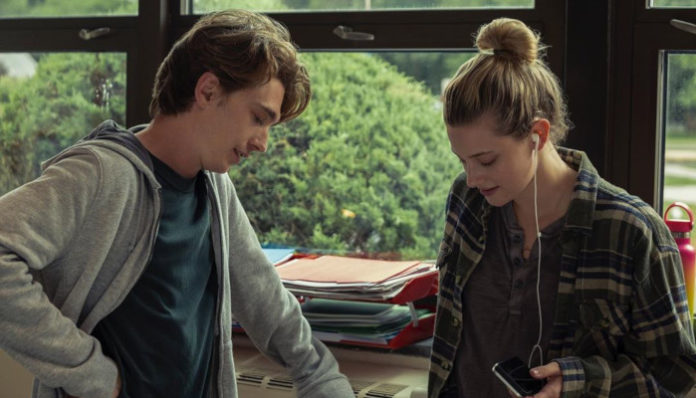
“Adults are just scarred kids who were lucky enough to make it out of limbo alive,” says Grace Town (Lili Reinhart) in Chemical Hearts, last Friday’s new Amazon Prime release. The movie is a Richard Tanne adaptation of Krystal Sutherland’s 2016 book Our Chemical Hearts. The 90-minute drama is moving, poignant, and depressing – and everyone needs to watch it.
Chemical Hearts follows Henry Page (Austin Abrams), a 17-year-old high school senior whose hobbies include writing for the school newspaper and repairing broken vases with strands of gold. Henry has never had a girlfriend, his parents have been in love forever, and his older sister is fighting through her medical residency and a traumatic heartbreak.
At the beginning of his senior year, Henry meets Grace Town (Reinhart), a fellow senior who just transferred schools. Grace wears oversized clothing and walks with a cane. She walks with her head down, refuses to drive, and gives away no information about her life. She’s mysterious and moody, and Henry develops a huge crush on her.
The plot line may sound like every teen romance movie ever. But what makes Chemical Hearts so different is the way in which its plot plays out. The audience is not meant to fall in love with Grace the same way that Henry does. The movie’s creators don’t expect us to root for their star-crossed love story.
Instead, Chemical Hearts gives us the opportunity to accept the main chracters’ flaws and find ourselves within them.
We see this in Grace’s horrific car accident, which took her boyfriend Dom’s life and badly injured her knee. Never quite processing her grief, Grace spends her afternoons bringing flowers to Dom’s grave with flowers and going to their secret koi pond.
Henry falls in love with the way Grace talks but doesn’t write, the way she shows him everything and nothing about herself and kisses him “like she’s in love with him.” But Grace can never fully love Henry, often breaking down after she has sex with him. Henry is there for her and loves her, but he can never replace Dom.
Reinhart’s depiction of Grace is refreshing and heartbreaking, especially as we watch Grace break down in the koi pond and tear up pictures of her lost love, stripping off her would-be wedding dress and screaming that it “should’ve been her.”
Henry and Grace aren’t able to overcome teenage limbo. They break up, despite their obvious connection and the affection that they share. Henry knows that his first love will not be his last, and Grace knows in order to fall in love again, she needs to work on herself. The couple parts ways – Henry leaves for college and Grace takes a year off to devote to therapy and healing. The movie’s ending is simplistic, sad, and beautiful.
But the most poignant part of Chemical Hearts is its message about mental health.
New love isn’t going to save Grace from her unresolved trauma; she has to save herself. Chemical Hearts reminds us that while romance may help us through our trauma for a little while, it’s never going to completely take away our traumatic experiences.
None of us is perfect. Many of us struggle with our mental health, and we all know that our relationships don’t always work out. But Chemical Hearts is a fantastic film for anyone who’s facing mental illness, heartbreak, or “growing pains.” The film reminds us that even when we break, we can still sew ourselves back together with strands of gold.
Henry Page and Grace Town may only be 17, but their journeys and emotions ring true for people of any age. If you’re looking for a heartfelt love story with characters that’ll resonate with you, Chemical Hearts is perfect for you!
Feature Image via Amazon Chemical Hearts Instagram


















